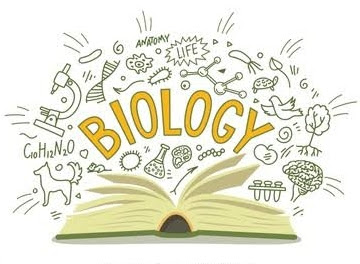
Bio means life and logy means study.
Biology, is the study of living things and their vital processes. The field deals with all the physicochemical aspects of life. The modern tendency toward cross-disciplinary research and the unification of scientific knowledge and investigation from different fields has resulted in significant overlap of the field of biology with other scientific disciplines. Modern principles of other fields, chemistry, medicine, and physics, for example are integrated with those of biology in areas such as biochemistry, biomedicine, and biophysics.
Major Branches of Biology
Biology is subdivided into separate branches for convenience of study, though all the subdivisions are interrelated by basic principles. Thus, while it is custom to separate the study of plants (botany) from that of animals (zoology), and the study of the structure of organisms (morphology) from that of function (physiology), all living things share in common certain biological phenomena for example, various means of reproduction, cell division, and the transmission of genetic material.
Biology is often approached on the basis of levels that deal with fundamental units of life. At the level of molecular biology, for example, life is regarded as a manifestation of chemical and energy transformations that occur among the many chemical constituents that compose an organism. As a result of the development of increasingly powerful and precise laboratory instruments and techniques, it is possible to understand and define with high precision and accuracy not only the ultimate physiochemical organization (ultrastructure) of the molecules in living matter but also the way living matter reproduces at the molecular level. Especially crucial to those advances was the rise of genomics in the late 20th and early 21st centuries.
Cell biology is the study of cells, the fundamental units of structure and function in living organisms. Cells were first observed in the 17th century, when the compound microscope was invented. Before that time, the individual organism was studied as a whole in a field known as organismic biology; that area of research remains an important component of the biological sciences. Population biology deals with groups or populations of organisms that inhabit a given area or region. Included at that level are studies of the roles that specific kinds of plants and animals play in the complex and self-perpetuating interrelationships that exist between the living and the nonliving world, as well as studies of the built-in controls that maintain those relationships naturally. Those broadly based levels, molecules, cells, whole organisms, and populations may be further subdivided for study, giving rise to specializations such as morphology, taxonomy, biophysics, biochemistry, genetics, epigenetics, and ecology. A field of biology may be especially concerned with the investigation of one kind of living thing for example, the study of birds in ornithology, the study of fishes in ichthyology, or the study of microorganisms in microbiology.
History of Biology
The history of biology traces the study of the living world from ancient to modern times. Although the concept of biology as a single coherent field arose in the 19th century, the biological sciences emerged from traditions of medicine and natural history reaching back to Ayurveda, ancient Egyptian medicine and the works of Aristotle and Galen in the ancient Greco-Roman world. This ancient work was further developed in the Middle Ages by Muslim physicians and scholars such as Avicenna. During the European Renaissance and early modern period, biological thought was revolutionized in Europe by a renewed interest in empiricism and the discovery of many novel organisms. Prominent in this movement were Vesalius and Harvey, who used experimentation and careful observation in physiology, and naturalists such as Linnaeus and Buffon who began to classify the diversity of life and the fossil record, as well as the development and behavior of organisms. Antonie van Leeuwenhoek revealed by means of microscopy the previously unknown world of microorganisms, laying the groundwork for cell theory. The growing importance of natural theology, partly a response to the rise of mechanical philosophy, encouraged the growth of natural history (although it entrenched the argument from design).
Over the 18th and 19th centuries, biological sciences such as botany and zoology became increasingly professional scientific disciplines. Lavoisier and other physical scientists began to connect the animate and inanimate worlds through physics and chemistry. Explorer-naturalists such as Alexander von Humboldt investigated the interaction between organisms and their environment, and the ways this relationship depends on geography—laying the foundations for biogeography, ecology and ethology. Naturalists began to reject essentialism and consider the importance of extinction and the mutability of species. Cell theory provided a new perspective on the fundamental basis of life. These developments, as well as the results from embryology and paleontology, were synthesized in Charles Darwin's theory of evolution by natural selection. The end of the 19th century saw the fall of spontaneous generation and the rise of the germ theory of disease, though the mechanism of inheritance remained a mystery.
In the early 20th century, the rediscovery of Mendel's work in botany by Carl Correns led to the rapid development of genetics applied to fruit flies by Thomas Hunt Morgan and his students, and by the 1930s the combination of population genetics and natural selection in the "neo-Darwinian synthesis". New disciplines developed rapidly, especially after Watson and Crick proposed the structure of DNA. Following the establishment of the Central Dogma and the cracking of the genetic code, biology was largely split between organismal biology the fields that deal with whole organisms and groups of organisms—and the fields related to cellular and molecular biology. By the late 20th century, new fields like genomics and proteomics were reversing this trend, with organismal biologists using molecular techniques, and molecular and cell biologists investigating the interplay between genes and the environment, as well as the genetics of natural populations of organisms.
.jpeg)

